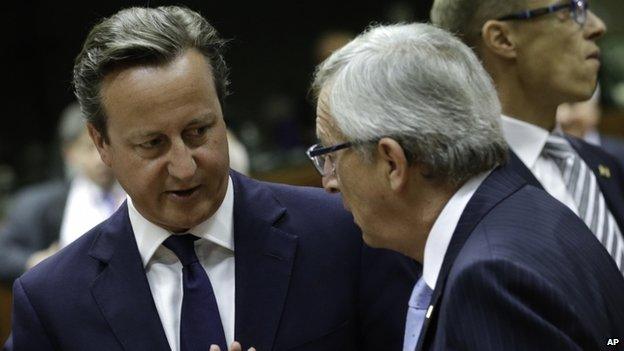Change comes to Brussels with Jean-Claude Juncker
- Published
- comments
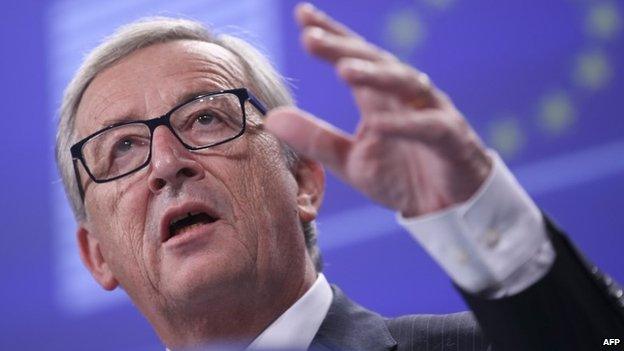
Jean-Claude Juncker has struck a much more combative tone than his predecessors
It is only day four of the new European Commission and Brussels crackles with expectation. The Commission President Jean-Claude Juncker is blunt, abrasive and unafraid of a fight.
Compared with his predecessor he is unplugged. And the European press is revelling in the air of unpredictability.
He has already scrapped with two prime ministers, Matteo Renzi and David Cameron.
The cause of the row is the demand for a budget surcharge from both countries. In the case of the UK it amounts to £1.7bn (€2.1bn).
It has infuriated both London and Rome and Mr Renzi snarled at the bureaucrats and their "palaces" in Brussels.
Mr Juncker did not like the comments and, unlike other presidents before him, spoke his mind. "I am not the leader of the gang of bureaucrats," he told the Italian PM.
Mr Renzi did not like the criticism and replied, "I insist on respect", which in Brussels is being referred to as the Godfather response.
Mr Juncker also disliked the display of anger by David Cameron who thumped the lectern and said the surcharge was not only "unacceptable" but he would not pay it on 1 December.
Mr Juncker was not coded about this either.
He did not like the way certain prime ministers were behaving and, addressing Mr Cameron directly, said: "You are presenting things in a way that is not correct."
And then, at his first press conference, Mr Juncker threw in another jab.
"I don't have a problem with Mr Cameron," he said. "Mr Cameron has a problem with the other prime ministers." Commission presidents are rarely this blunt.
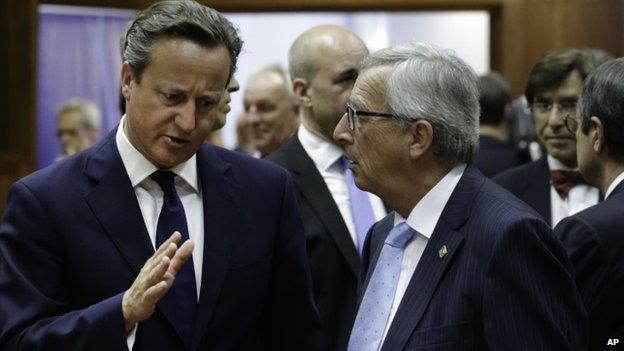
Jean Claude-Juncker is sending out a signal, saying he will not be pushed around
So Mr Juncker has set himself up as a man who doesn't tremble before prime ministers. The key word with him is "politician". He puts great store by the fact that he was elected.
Leave aside the fact that only around 5% of the EU electorate either knew they were voting for a Commission president or allowed it to influence the way they voted, Mr Juncker believes his election gives his Commission much greater legitimacy.
So he is sending out a signal. It amounts to: "Don't push me around, I have a democratic mandate. If your criticism is unjustified you'll be hearing from me."
An early test will be this argument over the budget surcharge.
Mr Juncker's instinct is that countries should abide by rules they had agreed to.
Then there is the reality of politics.
The row has already prompted numerous meetings in Brussels. The British have been in close contact with the Italians, the Dutch and the Greeks. They all are set to pay more.
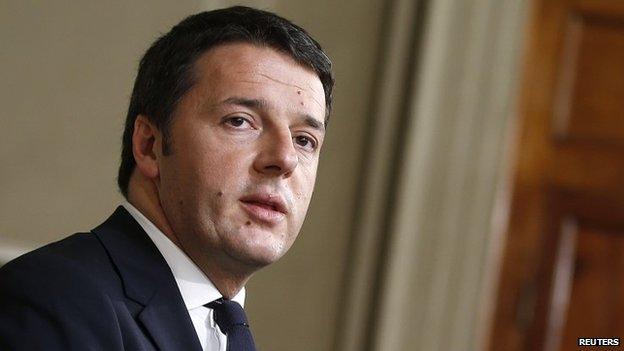
Italy's Prime Minister Matteo Renzi made clear to the new Commission president that he demanded respect
The search is on for a compromise. Certainly there has been discussion about changing the rules to allow for interest-free instalments paid over a much longer period.
The Prime Minister's office has reiterated that the issue is not just about a timeframe for payment but the scale of the bill.
Politically David Cameron will need to see that figure come down.
The matter will dominate the meeting of European finance ministers on Friday. The expectation is that the UK will end up paying a substantial surcharge but over a longer period.
From some countries there are dark mutterings about re-examining the British rebate. For the new Commission and the finance ministers this will provide an early challenge to the willingness to compromise.
Short honeymoon
On Wednesday Jean-Claude Juncker said he had had a "very agreeable week". He was open to a "proper dose of criticism".
Well, a storm blew in quicker than he imagined.
The International Consortium of Investigative Journalists cast its eye over the Duchy of Luxembourg.
It found billions being funnelled through the tiny state, external as part of what it regarded as huge tax avoidance deals involving hundreds of top global companies. A US treasury official is quoted as saying it was "akin to a magical fairyland".
For 19 years Mr Juncker was the Luxembourg prime minister.

The Commission is to press Luxembourg over allegations it offered tax breaks for global companies
Suddenly, Thursday was more like a Washington briefing.
"What did the president known and when?"
The Commission's official spokesman was asked whether Mr Juncker had a credibility problem
"What if investigations lead to Mr Juncker?"
Well, said the spokesman, Mr Juncker was very serene.
If he was a teenager he would be described as "cool", which was not quite the question being asked.
To be fair, the Commission is already investigating whether these tax arrangements amounted to state aid.
The Luxembourg government insists that the tax rules conformed to international law. And Mr Juncker has made it clear he will not interfere with any investigation.
But the political question remains: what did the president of the European Commission know about tax schemes that potentially deprived European taxpayers of billions of tax receipts?
Honeymoons can be short.
For the moment, the press likes this acerbic figure at the head of the European Commission and his more open staff.
Brussels seems less tight-lipped. And Mr Juncker, once denounced by David Cameron as a "classic Brussels insider", promises interesting and unscripted times.
But Mr Cameron should know, as he contemplates what reforms he will demand of Europe, that in the new president of the Commission he has a wily operator. A politician.
- Published6 November 2014
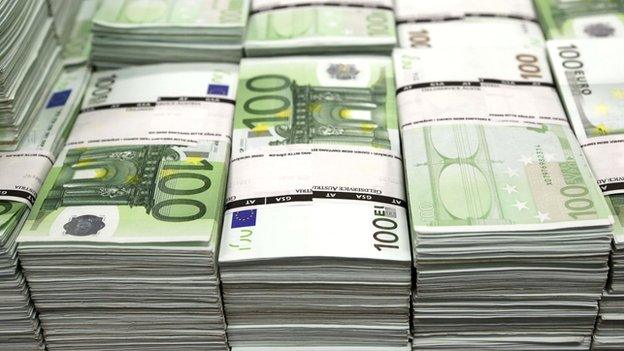
- Published5 November 2014
